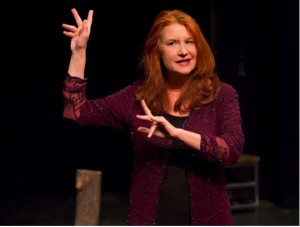Written in Sand
Moving elegies and fiery polemics from early in the AIDS era, but presented in a way that dilutes rather than concentrates their effect.
That vagueness interferes with our understanding of the texts. In one, for example, she has been to several funerals that very week and is now at a dinner party. Grief-stricken and angry, she rails against liberals who seem insufficiently concerned with the escalating plague. If this was 1985, such sentiments would have been completely understandable; however, even by 1987 it would have been very shortsighted, even ridiculous, to blame unconcerned liberals rather than the reactionary politicians who murderously blocked both medical research and needle exchange. On the other hand, when she does fill in some of these blanks, as with the eulogy for Ethyl Eichelberger, it makes a great difference.<
It tells us in the program that some of the texts we will hear were connected with the NEA’s despicable defunding of her work (the so-called “NEA Four” scandal); it would be of interest to know which ones.
This was my first in-person experience of Finley’s work, and unfortunately it was a shambles. What could have been forty intense minutes of poetry and music was padded with rambling introductions and mostly aimless patter to more than twice that. The night I attended she was nervous and flustered, repeatedly losing her place in the program, and allowing herself to be distracted over and over again by a leaky water pitcher. (Why didn’t the stage manager just replace it?) There was a setting behind her incorporating botanica candles and some sand, and she explained that the sand was laid out in the shape of a snake but didn’t tell us why.
In contrast to Finley’s lack of preparation, Nebenzahl was clearly determined to make the most of our limited time together. The single time that something did not seem to work (a sound sample mis-triggered), he increased his focus, rather than shrugging it off. He was an excellent collaborator, knowing when to take our attention, how long to keep it, and then cleanly giving it back. Finley does not seem to know that when you tell the band “pick it up,” as she did several times, it means “go faster,” and Nebenzahl very sensibly ignored that, instead coming a bit to the fore, fitting the spirit of the moment better than the letter.
Even when things ran smoothly for Finley, she would bounce between actually feeling the material (which was tremendously moving) and when she was ‘acting’ (which was arch and tedious). Given that the two most touching sequences were done without a microphone, it seemed the amplification functioned as a kind of shield, but as such it’s doubling as a barrier to her letting us feel what she’s trying to communicate. It might be wonderful if she would just sit down at a table and read, letting the spirits of our dead friends swirl about us as they might.
Let it be clear that this is not a call for smoothness and polish, an excess of which kills expression. Rather it’s a call for maximum impact, as even a barbaric yawp must be prepared with patience and care. These are such powerful stories, would that she would trust the writing more, or at least trust a director. Until then, her eloquence is better experienced on paper.
“Written in Sand” (Thursdays through October 23, 2014, encore performance November 22, 2014 at Laurie Beechman Theater, West Bank Cafe, 407 W.42nd Street, #212-352-3101)
Baruch Performing Arts Center, 55 Lexington Avenue, Manhattan
For tickets, call 866-811-4111 or visit http://www.OvationTix.com
http://www.vogue.com/3045433/fall-art-aids-epidemic-era/
Running time: one hours and 35 minutes with no intermission.







Leave a comment